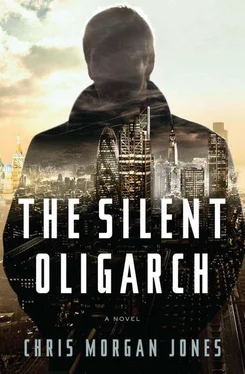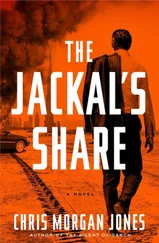The scene always played backward, in stages. He heard screams from a guest. He saw the doormen stop with bags in their hands. He saw the broken body flat on the flagstones outside the hotel, the dark suit covering it still strangely pristine. He heard the short heavy slam as it hit. But most vivid was Gerstman in the air, falling, not far, about fifty feet, perhaps for only a second or two. The image sat squarely in his mind, and he wondered whether his friend knew as he fell, as any sane man had to suspect, that his death was no accident.
As he set off to his regular meeting with Malin the day after the news this was all that was in his head, vivid and continuous. He had very little to report: from reading newspapers online he had discovered only that Dmitry had fallen to his death, and that alcohol was suspected to have played a part. The police were treating his death as suicide. Lock was not.
Lock’s office was on Kozhevnichesky pereulok, two miles down the Moscow River from the Kremlin and the Ministry of Industry and Energy. Every Tuesday he would go downstairs at 7:15 p.m. and his driver would take him to the ministry. There at eight he would brief Malin on the events of the week, always following the same agenda: Events, Opportunities, Threats. The meeting would last half an hour, sometimes forty-five minutes. There had been a time, before Malin had become the man he had become, when they would have dinner afterward, but for many years now Lock had simply had his driver take him home.
This evening, though, he felt like walking. This was unusual. He was no walker, and Moscow didn’t encourage a casual stroll. But after a day of sitting and worrying his back ached and his head ached and he longed for air and movement. And he had a call to make.
He set off for the river, joining it at Novospassky Bridge, and walked north along its west bank. A frost was beginning to set in, and in his thin raincoat he felt underdressed; he quickened his step to compensate. Beside him queues of cars breathed gray fumes into the air and across the water the low, white, martial walls of the Novospassky Monastery, sparsely floodlit, shone amber in the dark through bare, scrubby trees. But the cold was exhilarating and Lock was reminded that on nights like these, when real cold first steeped the city after its airless summer, even he could find it beautiful.
He took one of his phones from his coat pocket and found the number for his father. It was his birthday today. Lock should have called him that morning but hadn’t. Somehow speaking to his father from the office was too jarring, like calling home from the bed of your mistress.
He pressed the key and after a long pause the line began to ring.
“Hallo, met Everhart.”
“Happy birthday, Father. It’s Richard.” Lock spoke English to his father; his Dutch hadn’t been strong since he was young.
“ Dank u, Richard. It’s good of you to call.”
“Not at all. How are you?”
“I’m well, thank you.” Everhart tended to terseness on the phone. He saw it as a device to exchange information, no more.
“Did you get my card?”
“I did. Thank you.”
There had been a time when Lock, newly rich, would buy his father expensive presents: a watch, a fountain pen. After the third year his father had told him that he didn’t need anything and had asked him to stop.
“Have you had a good day?” Lock’s hand, exposed to the northerly wind that whipped down the river, was already stiff with cold.
“Yes. I walked to Zandvoort.”
“Not there and back?” Zandvoort was at least a dozen miles from Noordwijk.
“I took the bus back. It was a beautiful day.”
“Good, I’m glad. What about this evening? Are you doing anything?”
“Maartje is coming to cook for me.” Maartje lived in Noordwijk. Lock got the impression that she and his father saw a lot of each other.
“Good. Well, happy birthday.”
“Thank you for calling, Richard. Good-bye.”
“Good-bye.”
For a moment Lock felt that faint, residual sadness he felt whenever they spoke. He had no idea whether the call he had just made would please his father or sadden him too. It was this unknowability that was so wearing.
It wasn’t enough to distract him, though, from what had occupied him all day: Gerstman and Malin. Questions pressed against him, but one kept returning. Why would he want Gerstman dead? Why would Malin, so powerful, so safe in Russia, want his former underling dead? Dmitry had left years before, and had never done anything to suggest he was a threat. He was too clever for that.
After twenty minutes, as he crossed the river, his face now stinging with cold, the immense, impassable red wall of the Kremlin came into view. So much of Moscow felt fortified. The whole city could seem like a castle, the Kremlin the keep, the rest a vast bailey of peasants paying homage. Perhaps, he thought, despite that precise sense of dread in my stomach, Malin had nothing to do with this. After all, no one really knew what Dmitry had been doing in Berlin; he had had time enough to make enemies there. By the time Lock arrived at the ministry, an entirely nondescript building behind the gaping space that had once been the Rossiya Hotel, he had convinced himself that it made no sense for Malin to have killed Gerstman. It wasn’t logical, and Malin was always logical.
In the lobby he stated his business to a security guard behind a glass screen and surrendered his passport. He walked through a metal detector and was accompanied by another guard to Malin’s office, up two flights of stairs and along a broad, bare corridor. He knew the guard, and all the guards knew him.
He was a little early. He sat in his usual seat in the anteroom to the office and waited, making halting small talk with Malin’s secretary. At twenty-five past eight Malin’s door opened and a slight, canny-looking man came out carrying a briefcase. He had a mild stoop and his neck looked unnaturally taut from the effort of looking up.
“Alexei.”
“Richard.” They shook hands. This was Alexei Chekhanov, Lock’s opposite number. If Lock was offshore, Chekhanov was Russia. He ran Malin’s business there; he had no title, but his job, in effect, was chief executive of Malin Enterprises ZAO. As Lock had come to understand it through observation over the years—it had never been explained to him—Chekhanov made money for Malin in Russia and oversaw how that money was invested. When a foreign oil company paid over the odds for an exploration license, Chekhanov set the price and handled the arrangements. When the resulting profit needed investing, Chekhanov saw that it was wisely spent. When that investment threatened to go awry, it was he who made sure that it did not. He was the more important man by far but had the decency to treat Lock as an equal.
“That was a long one,” said Lock. “How is he?”
“We had a lot to discuss. This is a busy time.”
“You too? All good, I hope?”
“Yes, everything is good. I need to see you soon. There are things we need to discuss.”
“Anything interesting?”
“It is always interesting. A company in Bulgaria. Maybe something to sell in Kazakhstan. We will see.”
“Fine. Call me.”
“Very good. You should go.”
“I should. Good to see you, Alexei.”
Lock held his hand out, a little awkwardly, and they shook again. He knocked lightly on Malin’s door and went in. It was not a large or opulent office. Malin was reading some papers laid out on his desk, which was otherwise bare: a glass of water, a row of pens, no computer. On the wall behind the desk were two photographs: in one he was shaking hands with Yeltsin, in the other with President Putin. A third frame held his Order of Merit for the Fatherland, an eight-pointed star with a double-headed eagle in gold at its center.
Читать дальше












